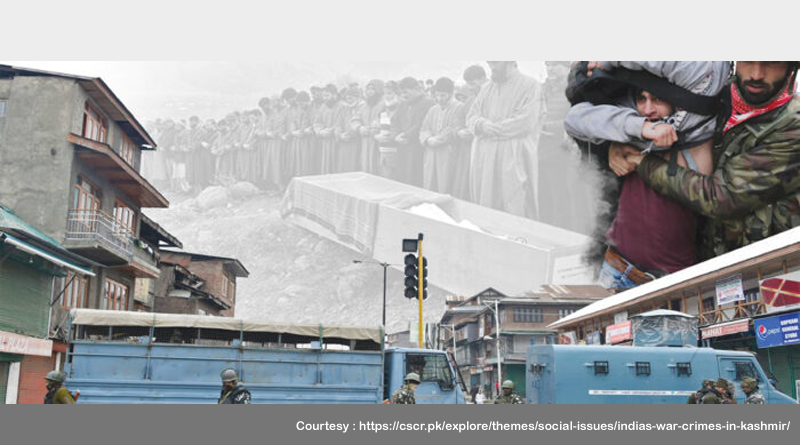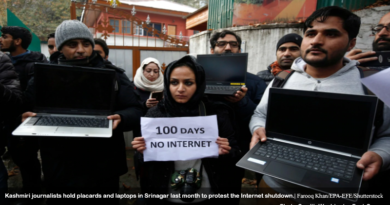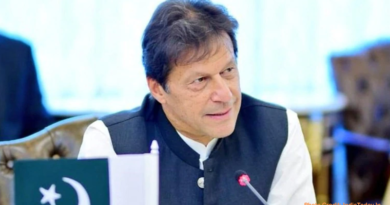India’s War Crimes in Kashmir
Khalil Dewan, the Head of Investigations at Stoke White, London, an international law firm, recently published a report titled ‘India’s War Crimes in Kashmir: Violence, Dissent and the War on Terror.’ Stoke White Investigations or SWI-unit is an independent investigative unit based in Stoke White Ltd’s law firm. SWI documented over 2000 testimonies of violence and war crimes committed by India, which exposed a systematic Indian campaign of human rights abuses and torture in the Indian Illegally Occupied Jammu and Kashmir (IIOJK). It is important to note that SWI was able to collect the data for the report over the course of a year.
SWI report cautions that these testimonies only partially represented the plight of the Kashmiris. It was impossible to get a complete picture of Indian atrocities in Kashmir due to the harassment of human rights investigators and restrictions placed on them by the Indian authorities. The report shows that Indian authorities use ‘domestic legislation ostensibly meant to maintain public order and a so-called ‘international counter-terrorism campaign’ as instruments of suppression and torture of Kashmiris.
The report records that two members of the SWI were arrested merely for interviewing the victims’ families. They were later released without any charges. Moreover, independent lawyers and journalists in IIOJK, who corroborated the report’s findings, are now facing the threat of raids and arrests for performing their duties as the upholders of human rights.
As part of the investigation, the SWI report confirms 450 cases of torture, 100 cases of enforced disappearance, 1500 cases of pellet gun victims, and 30 cases of sexual violence. Most testimonial accounts collected by SWI were verified by several lawyers, human rights defenders/practitioners, NGOs and journalists. It is claimed, in the report, that Indian authorities are using structural violence, which involves human rights abuses and torture, to suppress Kashmiri Muslims – primarily groups voicing dissent against Indian occupation.
As part of the investigation, the SWI report confirms 450 cases of torture, 100 cases of enforced disappearance, 1500 cases of pellet gun victims, and 30 cases of sexual violence.
The victims of war crimes and human rights abuses are denied access to justice. It is mentioned in the report that not a single Indian security official was charged for the violation of human rights in Kashmir in the last thirty years. The security officials systematically suppress any efforts by Kashmiris to report crimes perpetrated by security personnel.
According to the report, extrajudicial killings are a recurring pattern in the Indian scheme of suppressing Kashmiri Muslims. Instead of formally charging or prosecuting the individuals suspected of involvement in the resistance, the authorities frequently choose to kill them, apparently in a ‘fake encounter’. The report refers to specific cases of extrajudicial violence to confirm this pattern.
Among other cases, the case of Zia Mustapha was highlighted in the report. Zia Mustafa, a fifteen-year-old boy and a resident of Pakistan-administered Kashmir, was arrested by the Indian authorities for crossing the ‘Line of Control’. His detention continued for 18 years despite the fact that, during his trial, the prosecution was unable to bring forth compelling evidence proving his involvement in resistance against the Indian authorities. In July 2021, Zia was carried out of prison by Indian forces to Bhata Durian forest to ‘identify’ hideouts of fighters of a non-state armed group during an ongoing operation. During this exercise, Zia was killed extrajudicially. Indian authorities have falsely claimed that it happened during the crossfire in the fight with a non-state armed group. Sadly, Zia’s case was one of many extrajudicial killings cases recorded in the report.
The report mentions multiple testimonies of Kashmiri Muslims telling the investigation team about the inhumane torture of their family members by Indian security forces. The case of Azzad Shah was notable. Azzad Shah, an old man of fifty, had his home raided and was brutally beaten by police. According to his family, he was then taken into police custody, where he was tortured to death. The family was then intimidated by the Indian police and were not allowed to file a case for Azzad Shah. This case, unfortunately, is only one amongst many instances of torture by the Indian authorities.
Indian police, according to the report, also frequently makes use of pellet gun violence. The case of Shahan Ahmad, amongst other cases mentioned, was deeply tragic. He was a 21-year-old boy from Srinagar who worked as a security guard in a bank. He was killed on his way home after his shift. In his testimony, his brother, Shakeel Ahmad, reported that: “We initially thought [he’d] had an accident. When we reached the hospital, Shahan was dead. He had internal injuries in his abdomen. The nature of the injury indicated that he [had been] shot at very close range and an entire cartridge of pellets emptied on his abdomen.”
There have been many internationally credible reports on Indian atrocities in Kashmir, but this report has a unique value as it comes from a legal firm.
The most disturbing part of the report is the section on rape and sexual violence. Indian security personnel have routinely engaged in sexual violence to crush the spirit of the Kashmiri Muslims. The case of Fatima and her fifteen-year-old daughter Nargis was most devastating for the victims and the community. The mother and daughter were gang-raped by Indian national army personnel in Hardatorora. The report discloses other cases of gang rape by Indian security officials. Going through the report case by case can be highly unsettling for the reader.
The report further explains the Indian manipulation and exploitation of the Global War on Terrorism (GWOT) policy of the west to sustain and justify its human rights abuses in Kashmir. Recently, in the last two decades, India has made a conscious effort to publicize its dispute over Kashmir as a war against terror.
The report also reveals that Israeli intelligence is operating in IIOJK to support India in its so-called anti-terror campaign. In this context, the case of Karim was discussed in detail. Karim was an SWI unit’s ‘client’ who was tortured by Intelligence officers that he believed were of Israeli origin. He was taken into custody by the Indian National Army, where he was tortured under the pretext of ‘counter-terrorism’. The army provided no grounds for his detention. According to his testimony, he was kept in a room where two English-speaking white men interrogated him.
According to Karim, the agents interrogating him were trying to find out if Karim identified himself with the resistance in Afghanistan and Palestine. He claims that one of the officials specifically asked him about ‘Hamas’. The agents, according to the report, tried hard to demonstrate that Kareem’s affiliations were not limited to the struggle in Kashmir.
Karim’s case represents an alarming pattern that is emerging in the Indian strategy of crushing the spirit of Kashmiris. It shows how India’s growing cooperation with Israel is materializing in the Kashmiri conflict.
The investigation into the plight of Kashmiris and the subsequent report was a brilliant initiative by SWI to show the world the state of affairs in Kashmir. The report is extremely telling when it comes to Indian barbarity and brutality against the people of IIOJK. The testimonies of victims of violence and war crimes shared in the report are appalling and distressing at the same time. Following this investigation, in January 2022 the SWI-unit instructed its in-house lawyers at Stoke White law firm to begin legal proceedings using the Principle of Universal Jurisdiction over war crimes and abuses committed by Indian authorities in Jammu and Kashmir (J&K).
There have been many internationally credible reports on Indian atrocities in Kashmir, but this report has a unique value as it comes from a legal firm. The international community should take special note of this report and acknowledge human rights abuses committed by India in IIOJK. The report can provide a sound basis for the international community to exert pressure on the Indian authorities to stop committing war crimes and human rights abuses in IIOJK.
Tooba Ghaffar
Research Assistant in Center for International Strategic Studies
Courtesy: https://cscr.pk/explore/themes/social-issues/indias-war-crimes-in-kashmir/



